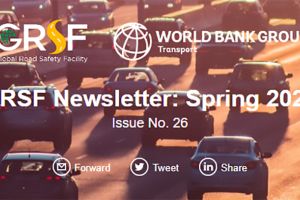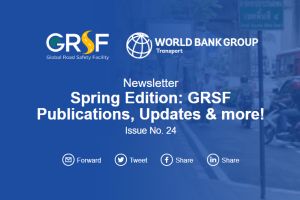Newsletter 17: GRSF Summer Updates 2020 | Winners of the GRSF Call for Proposal FY20
August 05, 2020

Winners of the GRSF Call for Proposal FY2020
GRSF recently announced the winners of the FY 2020 Call for Grant Proposals, a key mechanism of the ongoing GRSF Grant Program in selecting top quality road safety research initiatives. The nine successful grants total $1.711 million, span over a large geographical area, and focus on addressing the growing crisis of road traffic deaths and injuries in low-income countries. This was made possible thanks to the financial support of our UK Aid donors (Department for International Development and Department of Health and Social Care) and with the support of specialized experts from our GRSF Technical Advisory Panel.
While the process was very competitive, having received almost 50 applications requesting for $9.98 million, GRSF would like to thank all applicants for their excellent proposals and looks forward to collaborating with the successful teams on the implementation of their research projects.
In numbers: Results from GRSF Call for Proposal FY20

Highlights
|
GRSF supports creation of Occupational Road Risk Toolkit
Supported by the European Bank of Reconstruction & Development (EBRD) and financed by the UK Aid through GRSF, an international team has created the Occupational Road Risk Toolkit – a structured e-learning program in which fleet managers, drivers, and motorcycle riders can receive tailored content. This platform contains resources and free e-learning modules for different stakeholders to help manage risk across numerous road safety challenges. With this innovative tool, EBRD wants to improve the quality of management and vehicle fleet as well as the way in which road networks are used. > Learn more about the toolkit here |
How do you minimize road safety risks when implementing a large development project?
|
GRSF in Action
✅ GRSF Board Meeting: Effective Synergies Between GRSF's Donors
 On July 15, 2020 GRSF held a Semi-annual Board Meeting virtually with representatives of Bloomberg Philanthropies, CITA, DFID, DHSC/NIHR, EIB, Total Foundation, and the World Bank. GRSF had the opportunity to report on the progress in implementation of grant co-funded research activities that are made possible thanks to continuous financial support from Board donors.
On July 15, 2020 GRSF held a Semi-annual Board Meeting virtually with representatives of Bloomberg Philanthropies, CITA, DFID, DHSC/NIHR, EIB, Total Foundation, and the World Bank. GRSF had the opportunity to report on the progress in implementation of grant co-funded research activities that are made possible thanks to continuous financial support from Board donors.
In this meeting, GRSF presented its response to COVID-19, highlighting how GRSF is capturing synergies between its partners by working on various initiatives, including the preparation of a Funding Guide with WHO and a Global Speed Management Guide with WRI.
Additionally, GRSF provided updates on the GRSF Online Training and its ongoing success, with 344 participants in the facilitated course and an 85% completion rate. It was highlighted that the region with the highest number of participants completing the course was Sub-Saharan Africa followed by South Asia. The training was developed and delivered through the fruitful collaboration between GRSF and the Open Learning Campus of the World Bank.
✅ GRSF and CITA Making Vehicle Inspections Count in Cameroon
 In Cameroon, the Assessment of Vehicle Inspection Systems (AVIS) project was undertaken within the framework of the collaboration between GRSF and CITA (Comité International de l’Inspection Technique Automobile) with a view to upgrading vehicle inspections. The main objective of the project was to identify weak spots in systems for vehicle inspection and approval, and to propose an improvement strategy to make vehicles in Cameroon safer and more efficient.
In Cameroon, the Assessment of Vehicle Inspection Systems (AVIS) project was undertaken within the framework of the collaboration between GRSF and CITA (Comité International de l’Inspection Technique Automobile) with a view to upgrading vehicle inspections. The main objective of the project was to identify weak spots in systems for vehicle inspection and approval, and to propose an improvement strategy to make vehicles in Cameroon safer and more efficient.
The report diagnoses areas for improvements and highlights the lack of a comprehensive technical reference system for vehicle inspections and approvals to ensure vehicle safety and reduce polluting emissions.
> Read full report here
✅ GRSF Taking up the Role of Speed Management Hub under the BIGRS 2020-2025 Program
 In the new Bloomberg Philanthropies Initiative for Global Road Safety (2020-2025), GRSF is establishing a Speed Management Hub to improve speed management capacity in countries and cities under the Initiative. This work successfully kicked off in Buenos Aires, where the city and Bloomberg Philanthropies officially signed their agreement to work on the prevention of road crashes for the next 6 years.
In the new Bloomberg Philanthropies Initiative for Global Road Safety (2020-2025), GRSF is establishing a Speed Management Hub to improve speed management capacity in countries and cities under the Initiative. This work successfully kicked off in Buenos Aires, where the city and Bloomberg Philanthropies officially signed their agreement to work on the prevention of road crashes for the next 6 years.
With the support of the BIGRS, Buenos Aires now has a team of specialized technicians, as well as an international network of organizations that support government actions to improve road safety data management, safe road infrastructure, traffic surveillance and road safety communications. The GRSF, as the Speed Management Hub of the Initiative, has been assisting the city through the international partners on improving their automated enforcement through speed cameras.
> Learn more here (Spanish)
✅ Moving from Vision to Action: GRSF invites you to be part of the Vision Zero Challenge!
 GRSF is a proud partner of the Vision Zero Challenge – an initiative that promotes leadership in implementing a Vision Zero approach to road safety. The Vision Zero Challenge spotlights the importance of moving from #vision2action by celebrating those cities that are taking responsibility for road safety and providing the targeted support that their political and technical leaders need to develop a safe mobility system.
GRSF is a proud partner of the Vision Zero Challenge – an initiative that promotes leadership in implementing a Vision Zero approach to road safety. The Vision Zero Challenge spotlights the importance of moving from #vision2action by celebrating those cities that are taking responsibility for road safety and providing the targeted support that their political and technical leaders need to develop a safe mobility system.
The inaugural Vision Zero Challenge 2019-2020 focuses on cities in Latin America and the Caribbean, with the goal of targeting other regions in future rounds.
> Learn more about the projects and interventions carried out by the Vision Zero Challenge network
✅ GRSF and the UK Aid Initiative on Road Traffic Crash Related Mortality and Morbidity Research
 Monitoring levels and trends in premature mortality from road traffic crashes is crucial for understanding how governments can take accountability to address this epidemic. Injuries from road traffic crashes are another neglected epidemic in developing countries. The monitoring of global road safety performance is weak due to underreporting and inaccuracy. The lack of reliable data limits not only global performance monitoring but also explains why road mortality and morbidity may not always receive the attention they deserve.
Monitoring levels and trends in premature mortality from road traffic crashes is crucial for understanding how governments can take accountability to address this epidemic. Injuries from road traffic crashes are another neglected epidemic in developing countries. The monitoring of global road safety performance is weak due to underreporting and inaccuracy. The lack of reliable data limits not only global performance monitoring but also explains why road mortality and morbidity may not always receive the attention they deserve.
With funding from the UK Aid, the GRSF’s Road Safety Research Program has initiated two important research projects to understand the limitations of crash and injury data collection processes, existing estimation processes, and the status of disabilities from road traffic crashes. GRSF has initiated collaborations with the University of Chicago’s Department of Public Health Sciences, and the George Washington University’s Milken Institute School of Public Health on the mortality research and the morbidity research, respectively.
GRSF has also initiated a collaboration with the Global Burden of Disease (GBD) of the Institute for Health Metrics and Evaluation (IHME). The GDB, IHME at the University of Washington, is a comprehensive regional and global research program that provides tools to estimate and quantify the mortality and the morbidity from major diseases, injuries, and risk factors, including road traffic crashes.
✅ E-learning in times of social distancing: GRSF and IndiaRAP online series
 With support from the Bloomberg Philanthropies under the BIGRS 2020-2025, the GRSF and iRAP have partnered to deliver free periodic learning events on the iRAP methodology.
With support from the Bloomberg Philanthropies under the BIGRS 2020-2025, the GRSF and iRAP have partnered to deliver free periodic learning events on the iRAP methodology.
The first session focused on India, specifically on how the local IndiaRAP program was created and the safety assessments conducted across the country. The 4-part series held in June 2020 saw a record 448 participants from 53 countries attending the live sessions. In addition to this, 295 participants chose to participate in the online learning course where they could complete assignments for each session and get certifications.

The intention of the online learning series is to train road authorities and engineers around the world on the iRAP methodology, and support them in eliminating high-risk roads, unlocking the economic benefits of 3-star or better roads through results-based financing, and meeting global SDG and UN targets. We invite everyone to watch the recorded videos here:
> Session 1: Introduction to BIGRS and iRAP
> Session 2: Star Ratings and Safer Road Investment Plans
> Session 3: Introduction to ViDA
> Session 4: How road authorities can conduct iRAP safety assessments





